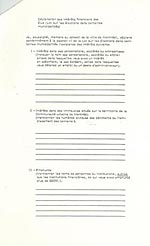

New electoral reforms
In 1978, the provincial government approved two reforms that would in turn, improve democratic life at the local level. The new electoral map was now made up of 54 districts, each one electing a councillor. That provision put an end to the system in effect since 1940 whereby several councillors were elected in each district.
The voting system was similar to the one applied at the provincial and federal levels, and favored a better representation of districts. Act 441 also regulated the financing of political parties, which were now required to file an annual report.
Corporations and firms were no longer allowed to financially support local parties, and a limit was placed on individual contributions.
In 1980, the municipal parties were officially recognized. Under Act 1052, they were governed along the same lines as provincial parties. All political groups had to be authorized by the Chief Electoral Officer of Québec.
There was a code of ethics that governed the nomination of leaders, the amount of electoral contributions and situations of conflict of interest whereby candidates were required to declare all their financial interests. Election expenses were also controlled. Candidates who won at least 20% of the votes or were elected were reimbursed for the expenses incurred during that period.
1. Act respecting the 1978 election in certain municipalities and amending the Cities and Towns Act.
2. Act to amend certain provisions of law respecting democratic procedure and the remuneration of elected officials in municipalities.

















